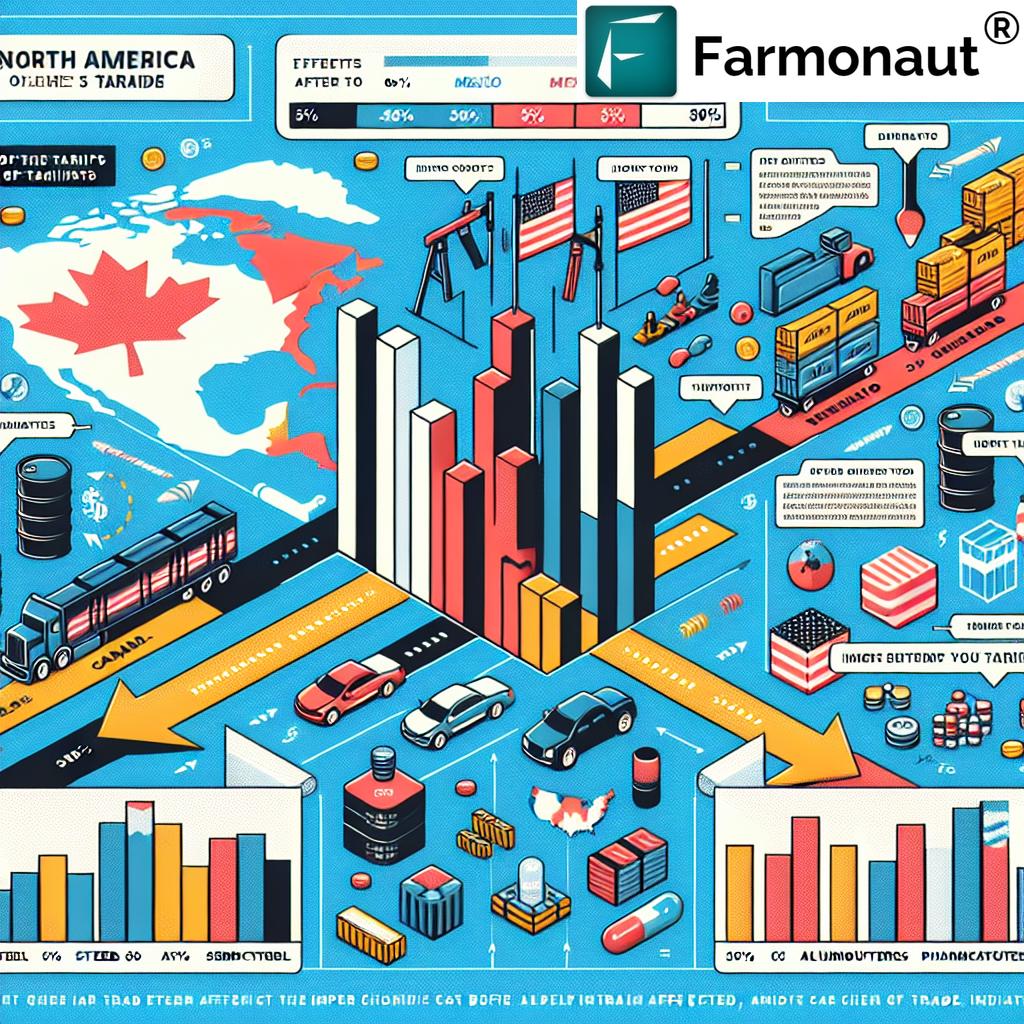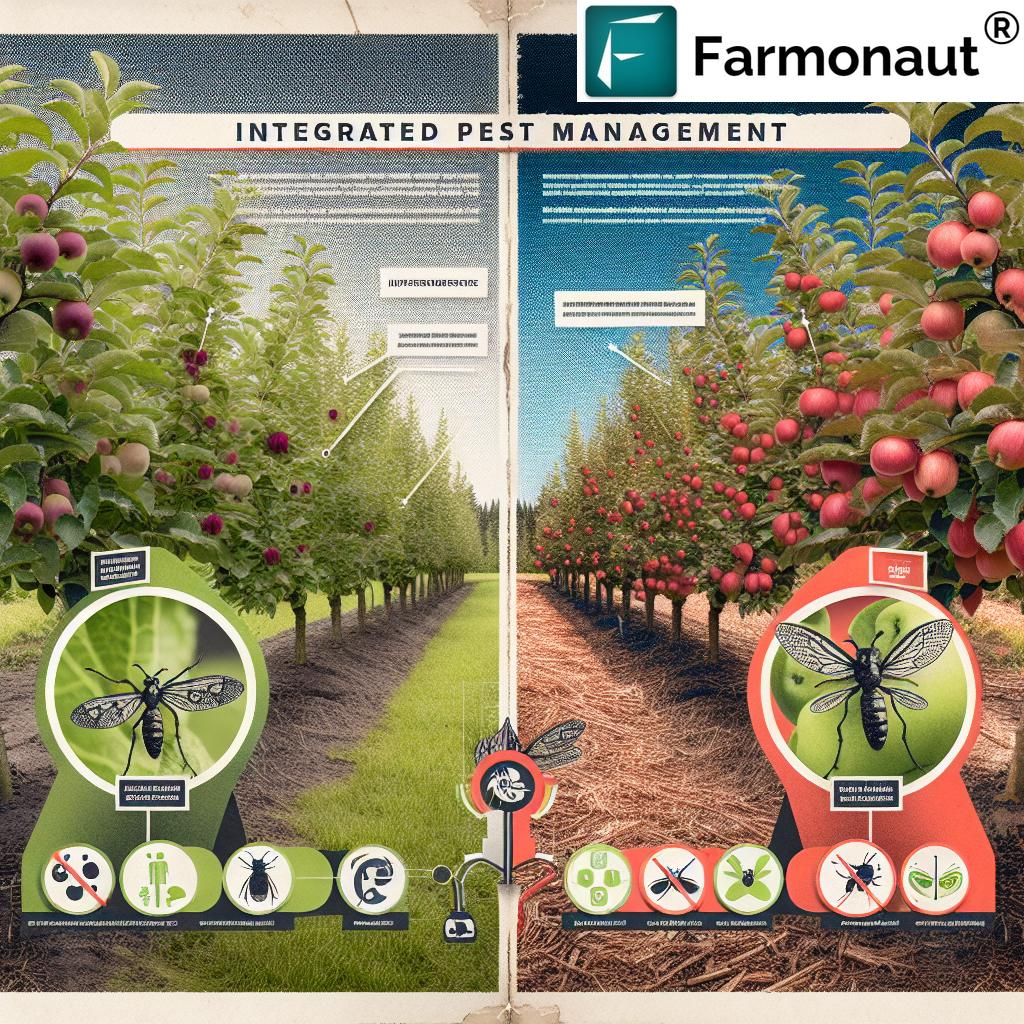Farmonaut Insights: US Tariffs on Canada and Mexico – Navigating Economic Risks in North American Trade
“The proposed 25% tariff on Canadian and Mexican imports could significantly disrupt North American supply chains in energy and automotive sectors.”
In the ever-evolving landscape of global trade, we at Farmonaut are closely monitoring the potential impacts of impending US trade tariffs on Canada, Mexico, and China. As a company dedicated to revolutionizing agriculture through satellite technology and data-driven insights, we understand the importance of staying informed about economic shifts that can affect our farmers and agribusinesses. Today, we’ll delve into the complexities of these tariffs and their potential ripple effects across North American trade and beyond.
Understanding the Tariff Landscape
President Donald Trump’s recent announcement of significant tariffs on key trading partners has sent shockwaves through the global economy. The proposed measures include:
- A 25% tariff on imports from Canada and Mexico
- A 10% import tax on goods from China
- Potential tariffs on the European Union
These actions are rooted in complex geopolitical issues, including concerns over illegal immigration, the fentanyl crisis, and accusations of unfair trade practices. However, the economic implications of these tariffs extend far beyond their intended purposes, potentially reshaping global trade dynamics and influencing future economic growth.

The North American Supply Chain Disruption
The proposed 25% tariff on Canadian and Mexican imports is poised to cause significant disruption in North American supply chains, particularly in the energy and automotive sectors. Canada and Mexico are not just neighbors; they are integral parts of a deeply interconnected economic ecosystem.
Key industries at risk include:
- Energy: The United States relies heavily on Canadian and Mexican oil imports, accounting for nearly 60% of its crude oil supply. Tariffs could lead to increased energy costs for US consumers and businesses.
- Automotive: The auto industry, with its complex cross-border supply chains, could face severe challenges. In 2024, vehicles imported from Canada and Mexico made up 22% of US light vehicle sales.
- Agriculture: Both Canada and Mexico are major suppliers of agricultural products to the US, contributing billions of dollars annually to the food supply chain.
At Farmonaut, we recognize the potential impact on agricultural supply chains. Our satellite-based crop health monitoring and AI advisory systems can help farmers navigate these uncertain times by optimizing their resource management and crop yields.
Economic Risks and Inflationary Pressures
The introduction of these tariffs poses significant economic risks, with concerns emerging about potential adverse effects on consumer spending and business investment due to escalating import costs.
“A 10% import tax on Chinese goods, combined with other tariffs, may reshape global trade dynamics and impact multiple industries.”
EY chief economist Gregory Daco predicts that inflation will rise by approximately 0.7 percentage points in the first quarter as a direct result of these tariffs. This inflationary pressure could have far-reaching consequences:
- Reduced consumer purchasing power
- Increased production costs for businesses
- Potential slowdown in economic growth
While some of President Trump’s supporters believe that promised tax cuts and deregulation might offset inflationary pressures and stimulate growth, many economists remain skeptical about the long-term benefits of such an approach.
Global Implications and Potential Retaliation
The impact of these tariffs extends beyond North America. The 10% import tax on Chinese goods, coupled with potential tariffs on the European Union, could trigger a cascading effect on global trade patterns. Industries such as semiconductors, steel, aluminum, pharmaceuticals, and oil and gas may face significant challenges.
Moreover, the risk of retaliation from affected countries is high. Canadian Prime Minister Justin Trudeau has assured that Canada is prepared to react strongly if tariffs are enacted. Similarly, Mexican President Claudia Sheinbaum has articulated a calm yet prepared stance regarding possible developments from Washington.
This potential for trade wars and retaliatory measures creates an environment of uncertainty that could impact:
- Global supply chains
- International investment patterns
- Diplomatic relations
At Farmonaut, we understand that these global shifts can have local impacts on farmers and agribusinesses. Our API and API Developer Docs provide tools for integrating real-time agricultural data into decision-making processes, helping our clients navigate these uncertain waters.
Impact on Specific Industries
Let’s take a closer look at how these tariffs might affect key industries:
Oil and Gas
The energy sector stands to be significantly impacted by these tariffs. With Canada being a major supplier of crude oil to the United States, a 25% tariff could lead to:
- Increased costs for US refiners
- Higher gasoline prices for consumers
- Potential shifts in global oil trade patterns
However, President Trump has hinted at potentially reducing tariffs on crude oil imports from Canada and Mexico, recognizing their critical role in US energy supply.
Automotive Industry
The automotive sector, with its deeply integrated North American supply chains, faces substantial risks. Potential consequences include:
- Higher production costs
- Increased vehicle prices for consumers
- Disruptions in manufacturing processes
These challenges could lead to job losses and economic slowdowns in regions heavily dependent on the automotive industry.
Agriculture
The agricultural sector, already facing challenges from climate change and market volatility, could see additional pressures from these tariffs. Impacts may include:
- Disrupted supply chains for imported agricultural products
- Potential retaliation affecting US agricultural exports
- Increased costs for farmers relying on imported equipment or inputs
At Farmonaut, we’re committed to supporting farmers through these challenges. Our satellite-based crop health monitoring and AI-driven advisory services can help optimize resource use and improve resilience in the face of economic uncertainties.

Financial Market Volatility
The implementation of these tariffs is likely to introduce significant volatility into financial markets. Factors contributing to this instability include:
- Uncertainty surrounding US trade policy
- Potential retaliation from affected countries
- Shifts in global investment patterns
Investors and businesses may face challenges in long-term planning and risk management as they navigate this uncertain landscape.
Political and Diplomatic Implications
Beyond the economic sphere, these tariffs have significant political and diplomatic implications:
- Strained relationships with key allies and trading partners
- Potential shifts in global alliances and trade agreements
- Domestic political debates over the efficacy of tariff-based trade policies
The long-term consequences of these diplomatic tensions could reshape international relations for years to come.
Comparative Impact of US Tariffs on North American Trade
| Country | Proposed Tariff Rate | Major Affected Industries | Estimated Economic Impact (USD) | Potential Retaliatory Measures |
|---|---|---|---|---|
| Canada | 25% | Energy, Automotive, Agriculture | $50-60 billion annually | Tariffs on US imports, legal action through USMCA |
| Mexico | 25% | Automotive, Agriculture, Manufacturing | $40-50 billion annually | Tariffs on US agricultural products, diversification of trade partners |
| China | 10% | Electronics, Textiles, Machinery | $30-40 billion annually | Increased tariffs on US goods, restrictions on rare earth exports |
Navigating the Challenges with Farmonaut
In these uncertain times, Farmonaut stands ready to support farmers and agribusinesses with our cutting-edge technology:
- Satellite-Based Crop Health Monitoring: Our advanced monitoring system helps farmers optimize resource use and improve crop yields, crucial in a potentially inflationary environment.
- AI-Driven Advisory Services: Our Jeevn AI system provides personalized recommendations, helping farmers make informed decisions in a changing economic landscape.
- Blockchain-Based Traceability: In an era of complex trade relations, our traceability solutions ensure transparency and trust in agricultural supply chains.
Explore our solutions:
Looking Ahead: Future Scenarios and Strategies
As we navigate this complex trade landscape, several potential scenarios emerge:
- Full Implementation of Tariffs: This could lead to significant economic disruption and potential retaliation from affected countries.
- Negotiated Compromises: Diplomatic efforts might result in modified tariff structures or alternative trade agreements.
- Gradual Phasing of Tariffs: A more measured approach could allow for economic adjustment and mitigation strategies.
Regardless of the outcome, businesses and farmers should consider the following strategies:
- Diversifying supply chains and markets
- Investing in efficiency-enhancing technologies
- Staying informed about policy developments and economic trends
Farmonaut’s Role in Economic Resilience
At Farmonaut, we’re committed to supporting agricultural resilience in the face of economic challenges. Our technologies offer several advantages:
- Cost-Effective Precision Agriculture: Our satellite-based solutions provide affordable access to advanced farming techniques, crucial for maintaining competitiveness in a potentially inflationary environment.
- Data-Driven Decision Making: In uncertain times, informed decisions are more important than ever. Our AI-driven insights help farmers optimize their operations based on real-time data.
- Sustainability Focus: Our tools for carbon footprint tracking and efficient resource management align with growing global emphasis on sustainable practices, potentially offering a competitive edge in evolving markets.
Earn With Farmonaut: Join our affiliate program and earn 20% recurring commission by helping farmers save 10%. Onboard 10 Elite farmers monthly to earn a minimum of $148,000 annually—start now and grow your income!
Conclusion: Adapting to a Changing Trade Landscape
The potential implementation of US tariffs on Canada, Mexico, and China represents a significant shift in North American and global trade dynamics. While the full impacts remain to be seen, it’s clear that businesses, particularly in the energy, automotive, and agricultural sectors, need to prepare for potential disruptions and increased costs.
At Farmonaut, we remain committed to providing innovative solutions that help farmers and agribusinesses navigate these challenging times. By leveraging our satellite technology, AI-driven insights, and blockchain-based traceability, we aim to enhance agricultural resilience and productivity, regardless of the economic climate.
As we move forward, staying informed, adaptable, and technologically empowered will be key to thriving in this evolving trade landscape. We encourage our readers to explore our suite of tools and services designed to support agricultural success in any economic environment.
FAQ Section
Q: How might the proposed tariffs affect food prices in the US?
A: The tariffs could potentially lead to increased food prices as they may raise costs for imported agricultural products and inputs used in food production. However, the exact impact will depend on various factors, including potential retaliatory measures and market adaptations.
Q: What strategies can businesses use to mitigate the impact of these tariffs?
A: Businesses can consider diversifying their supply chains, exploring alternative markets, investing in efficiency-enhancing technologies like those offered by Farmonaut, and staying informed about policy developments to make timely strategic decisions.
Q: How might these tariffs affect the automotive industry in North America?
A: The automotive industry, with its deeply integrated North American supply chains, could face significant disruptions. This may lead to increased production costs, potentially higher vehicle prices for consumers, and possible shifts in manufacturing and sourcing strategies.
Q: What role can technology play in helping farmers navigate these economic challenges?
A: Technologies like Farmonaut’s satellite-based crop monitoring and AI-driven advisory services can help farmers optimize resource use, improve crop yields, and make data-driven decisions. This can be crucial for maintaining profitability and competitiveness in a challenging economic environment.
Q: How might these tariffs impact global efforts to address climate change and promote sustainable practices?
A: The tariffs could potentially impact global cooperation on climate issues and affect the adoption of sustainable technologies. However, they might also drive increased focus on local and sustainable production methods, potentially accelerating innovation in these areas.
















